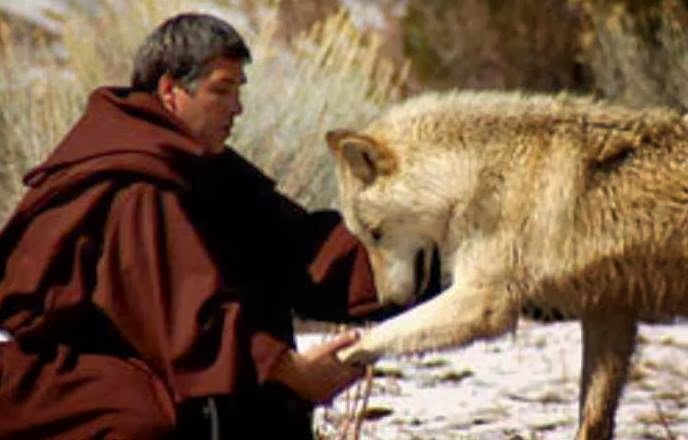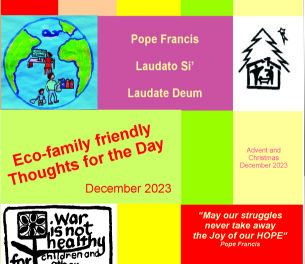December 17. Mario loved to tell the story of St Francis and the wolf to his grandchildren. It had become part of their family tradition as they prepared for Christmas.
ST FRANCIS TAMES THE FIERCE WOLF OF GUBBIO. A Story from THE LITTLE FLOWERS OF ST FRANCIS. “A large fierce and terrifying wolf was terrorizing the people of the town of Gubbio, devouring their animals and attacking the people too. So they needed to go about armed and were afraid to go beyond the city walls. When St Francis heard about this he felt great compassion for the people and decided to go and meet the wolf, even though he was warned not to do so. Making the sign of the cross and putting all his confidence in God he went out with some of his brothers. But they were too afraid and watched from a distance with other townspeople. So Francis went alone. When the wolf saw him he ran forward with his jaws wide open. Francis again made a sign of the cross and cried out: “Come here, Brother Wolf; I command you, in the name of Christ, not to harm me or anybody else.” No sooner had St Francis made the sign of the cross, than the terrible wolf, closing his jaws, stopped running, and coming up to St Francis, lay down at his feet as meekly as a lamb. Francis then spoke to him, “Brother wolf, you have done much evil in this land, destroying and killing the creatures of God without his permission. Not only animals have you destroyed, but you have even dared to devour men, made after the image of God. For this you should be hanged like a robber or a murderer. All the inhabitants of this city and their dogs are your enemies and pursue you, but I will make peace between you. If you will do no more harm they will forgive you and will no longer pursue you. Will you make a promise.” The wolf gave his paw to Francis to signify his acceptance. St Francis added, “ I promise that you will be fed every day by these inhabitants as long as you live among them and shall never suffer hunger as that is what made you do so much evil. Will you make this promise.” The wolf bowed his head as a sign and then walked by his side towards the town. As the news spread, the inhabitants flocked to the market place to see St Francis and the wolf. St Francis preached to the people telling them how, for our sins, God permits such calamities. How much greater and more dangerous are the flames of hell which last forever, than the rage of a wolf which kills the body only.

The wolf lived for two years at Gubbio and went familiarly from door to door without harming anyone, and all the people received him courteously, feeding him with great pleasure, and no dog barked at him. After two years he died of old age and the people mourned his loss greatly as he reminded them of the virtue and sanctity of St Francis.
Pope Francis: The creation accounts in the book of Genesis contain in symbolic and narrative language profound teachings about human existence and relationships with God, our neighbour and with nature. These relationships have been broken through sin. LS 66. Other living beings have a value of their own in God’s eyes. By their mere existence they bless him and give him glory. LS69. For Reflection and sharing. Do we do enough to protect wild life from all the hazards they face? Our indifference or cruelty towards fellow creatures of this world sooner or later affects the treatment we mete out to other human beings. Comment.
December 18. Peacemaking in Damietta. Members of the Justice and Peace group explained to the parish, “The DAMIETTAescapade is one of the most significant events in the life of Francis. It has been seen in different ways by different players. From the perspective of the five Crusades which aimed to recapture the Holy Land from the Muslims it was both madness, a risk and a failure. As a forward-looking initiative for peace-making and peaceful co-existence, and interreligious dialogue it was a memorable success. We promote his vision of peace-making wherever we can.”
From St Francis UNCENSORED. Francis’s ministry developed in response to what he experienced as the voice of God calling him from time to time. In 1219 he told his brothers that he believed God was sending him on a crusade of his own. He was not interested in the liberation of the Holy Land and his desire was not to fight, but to meet the leaders of the Islamic world. He planned to travel, with Brother Illuminato, and to use the Church’s crusader armies camped outside the strategically important Muslim city of Damietta in the Nile delta and to hop, skip and jump his way into the Muslim camp. One morning during a year-long lull in the war Francis made his move and arrived at the Crusader camp. He was accepted with some suspicion by the resident bishop and military chaplains. They thought, “This was no place for drifter mendicants,” “He isn’t even a priest,” some whispered. They didn’t know how to treat him as he was personally known and approved by the Pope. Francis could feel the tension and realized that they were worlds apart in their approach.

After resting for a few days praying for guidance he and Brother Illuminato set out alone into the desert heat. They were captured by the Muslims and brought to Sultan Malek al-Kamil, who was soon intrigued by these two unassuming Christians who didn’t even carry a weapon. The brothers spent two weeks of amazing, eye-opening spiritual discussion with the Sultan who then gave them safe passage on their way home.
Francis was changed in many ways through this experience, he felt quite “overwhelmed by his own recent actions, his sheer audacity, his strange courage, his childlike daring, his amazing trust in God.” (Noonan in St Francis UNCENSORED compares this action to attempting a private meeting with Osama Bin Laden. He writes, “Francis’ unorthodox approach of exploring peace and love for solutions and his total lack of affectation or attitude, sometimes called humility, carried the day.”) Francis had been especially moved to see Muslim soldiers praying five times a day, knowing that Christian soldiers barely prayed at all. On his return home he asked for church bells to be rung during the day to announce prayer times too. Did they try to convert each other? It is not clear. They had spoken and listened attentively. It is reported that the sultan had been prepared to convert but feared for all their safety so Francis promised to send some friars to him after his return home which he did.
To conclude Francis’ Damietta story; a few weeks after these conversations the Christians Crusader army killed 78 000 Muslims. However not long after that the Muslims began to get the upper hand and two years later the defeated crusaders abandoned Damietta and the age of the crusaders came to an end.
St Francis included a chapter on mission to non-believers in his Rule, emphasizing peaceful co-existence as the foundation for every mission. His meeting with the Sultan still serves as a strong impetus and example for dialogue among peoples and religions today, as Pope Francis has done on a number of occasions including his meeting in Abu Dhabi in February 2019 with the Grand Imam. In our day there is still no real peace between Christianity and Islam, as the periodic attacks in western countries by radical Islamic terrorist groups prevent better relationships.
Pope Francis: From Fratelli Tutti. Francis did not wage a war of words aimed at imposing doctrines; he simply spread the love of God. He understood that “God is love and those who abide in love abide in God” (1 Jn 4:16). In this way, he became a father to all and inspired the vision of a fraternal society. Indeed, “only the man who approaches others, not to draw them into his own life, but to help them become ever more fully themselves, can truly be called a father”. In the world of that time, bristling with watchtowers and defensive walls, cities were a theatre of brutal wars between powerful families, even as poverty was spreading through the countryside. Yet Francis was able to welcome true peace into his heart and free himself of the desire to wield power over others. He became one of the poor and sought to live in harmony with all. FT 4. For Reflection and Sharing. What are the benefits of interfaith dialogue?





Recent Comments